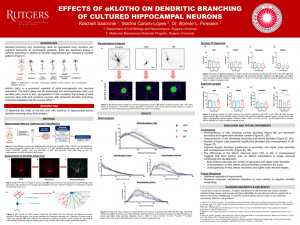Sadovnik, Ratchell: Effects of Αklotho on Dendritic Branching of Cultured Hippocampal Neurons
Title: Effects of Αklotho on Dendritic Branching of Cultured Hippocampal Neurons
Name: Ratchell Sadovnik
Major: Cell Biology & Neuroscience
School affiliation: School of Arts and Sciences
Programs: Division of Life Sciences Summer Undergraduate Research Fellowship (DLS-SURF)
Other contributors: Bonnie L. Firestein and Marina Cararo-Lopes
Abstract: Neuronal complexity, specifically dendrite branching and morphology, allows for specialized brain functions and cognitive behaviors. Dendrites, in particular, are essential for helping the nervous system integrate and respond accordingly to internal and external stimuli. In fact, the degree to which a dendrite branches is directly proportional to the amount of signals the neuron receives and processes. Therefore, dendrites play significant roles in the functional plasticity of the brain. In neurological diseases, there are significant losses in dendritic branching in addition to dendrite fragmentation and changes in dendrite patterns. Further understanding of how neurons mature and how branching is controlled is important for elucidating mechanisms of plasticity abnormalities that lead to neuronal dysfunction and to reveal possible therapeutic targets to treat central nervous system diseases. αKlotho (αKL) is a prominent regulator of adult neurogenesis and neuronal maturation. The klotho gene can be transcribed into transmembrane (mKL) and secreted (sKL) forms. Studies have shown that overexpression of αKL increases the number of adult neuronal stem cells and immature neurons with enhanced dendritic branching, while downregulation does the exact opposite. Despite these findings, no data have been collected on the effects of neuronal-specific expression of αKL isoforms on dendritic branching. Studies in the Firestein laboratory have previously addressed αKL isoforms as potential targets for restoring brain function after a traumatic brain injury, and so we wanted to see what role each klotho isoform plays on dendritic branching, and if one plays a superior role to the other. We used the Bonfire program, a semi-automated Sholl analysis developed by our laboratory to provide a fast, reproducible, and detailed analysis of the dendrite arbor.
